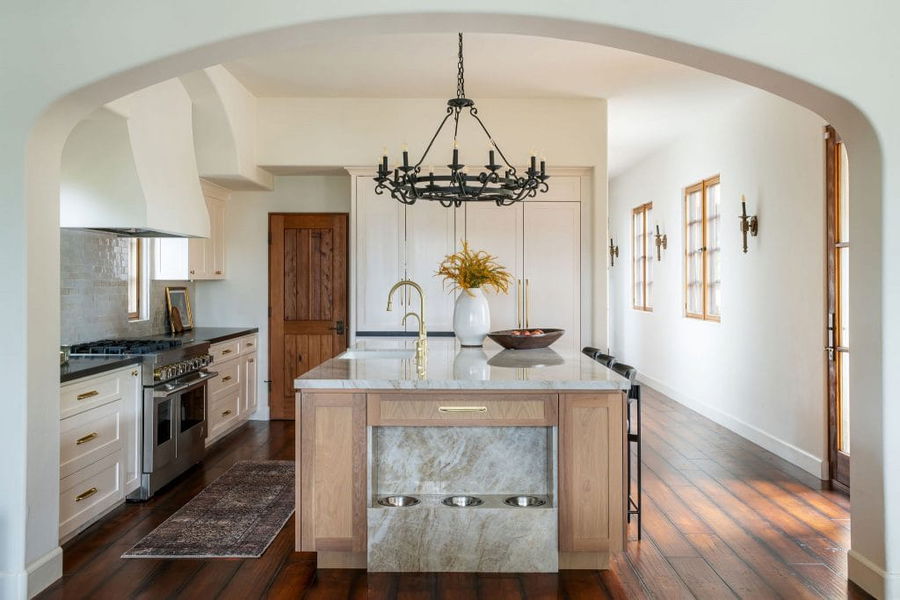
Have you ever wondered which surface material suits your home? With so many types of kitchen countertops to choose from, selecting the right one can pose quite a challenge. Let’s break down the most popular options to help you decide what works best for your space.
Key Factors to Consider When Choosing a Countertop Material
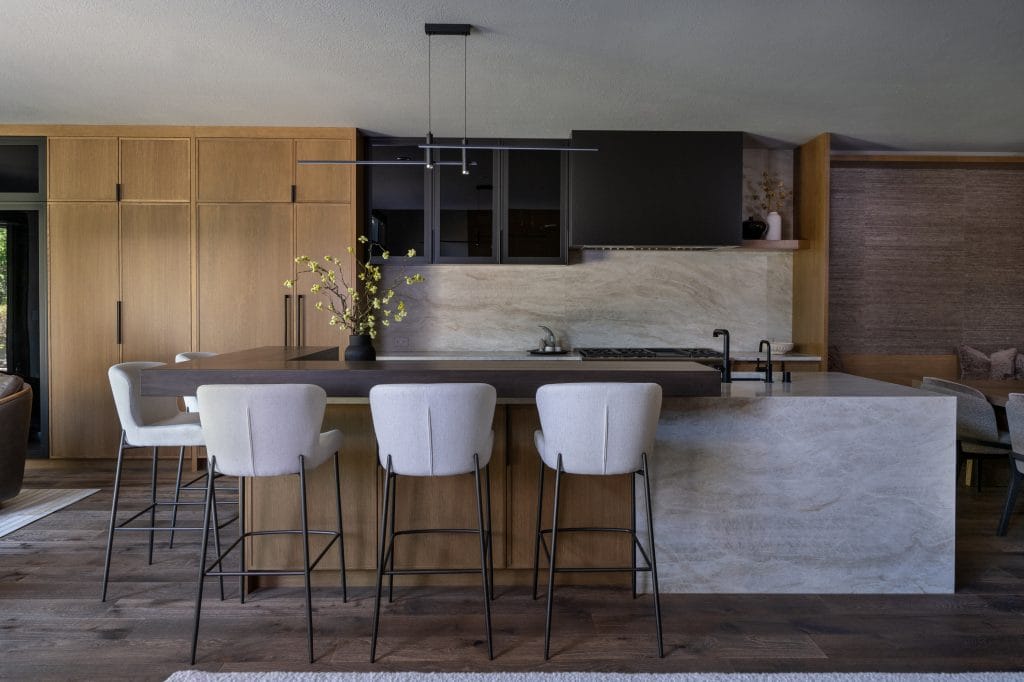
Choosing a countertop is more than just another kitchen remodel choice. It is about balancing style with practicality. Here are the key factors to keep in mind when selecting your kitchen countertop materials:
- Durability: How well does the material handle everyday use, heat, and spills?
- Maintenance: Does it require sealing, extra care, or special cleaning methods?
- Cost: What fits within your budget and offers the best value over time?
- Style: Does it complement the overall look and feel of your kitchen?
- Functionality: Which types of kitchen countertops suit your cooking habits and lifestyle?
Pro Tip: Lost in different types of kitchen countertops and unsure which one makes the right choice for you? Try our Free Interior Design Style Quiz to discover your ideal style today!
Popular Kitchen Countertop Materials
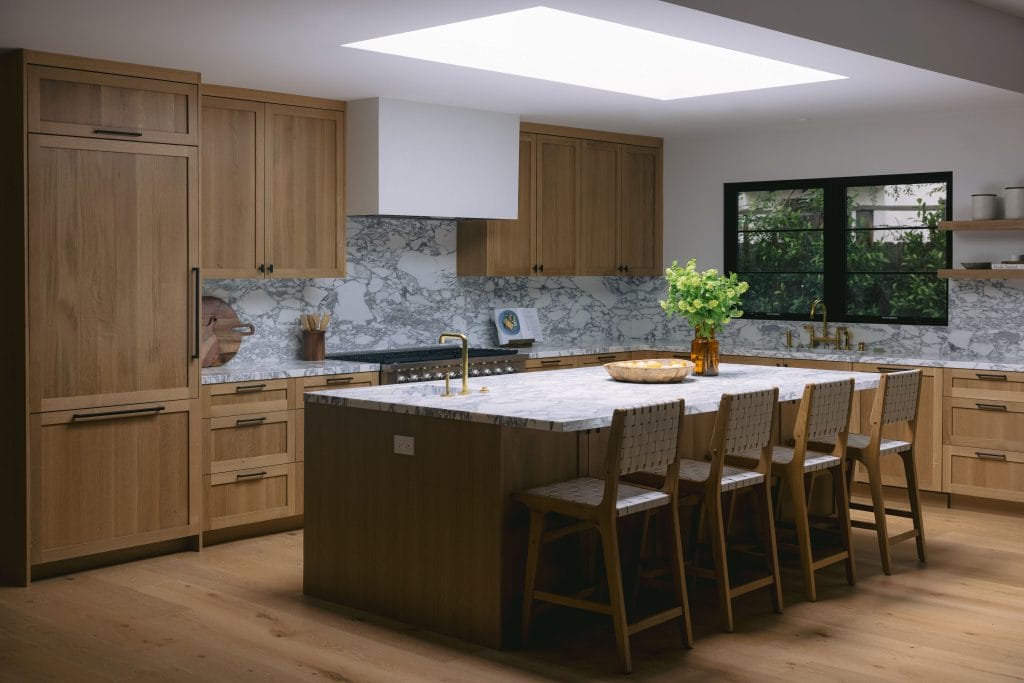
Homeowners today have plenty of different countertop types to choose from, each offering its unique set of benefits and trendy kitchen appeal. Below are some of the most popular materials to consider for your next kitchen upgrade.
1. Quartz Countertops: The Low-Maintenance Star
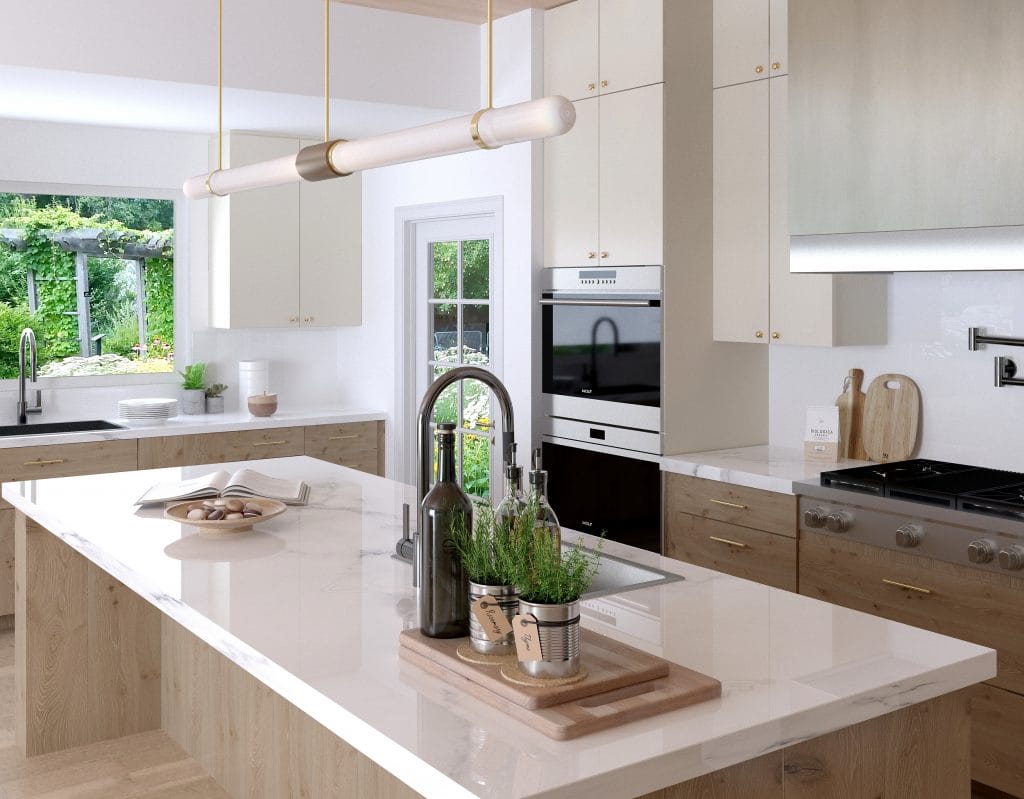
Quartz countertops are engineered from natural quartz crystals, mixed with resin and other materials. This non-porous surface offers the beauty of stone without the high upkeep, making it one of the most sought-after materials for kitchens. Available in a wide variety of patterns, from clean, modern whites to veined styles that mimic marble, quartz suits nearly any stunning kitchen design.
Pros
- Scratch and Stain Resistant: The combination of quartz and resin makes it highly resistant to both scratches and stains.
- Consistent Patterns: Unlike natural stone, quartz countertops provide a uniform look throughout a large surface.
- Non-Porous: The surface does not require sealing and is less likely to harbor bacteria or germs, which is perfect for food preparation.
Cons
- Not as Heat-Resistant: Although durable, quartz can be damaged by hot pots and pans, making it necessary to use trivets or hot pads.
- Visible Seams: Large countertops may have noticeable seams, as quartz is not one solid slab like granite.
- Prone to Chips: While scratch-resistant, quartz can chip if heavy objects are dropped on it.
2. Granite Countertops: The Timeless Masterpiece
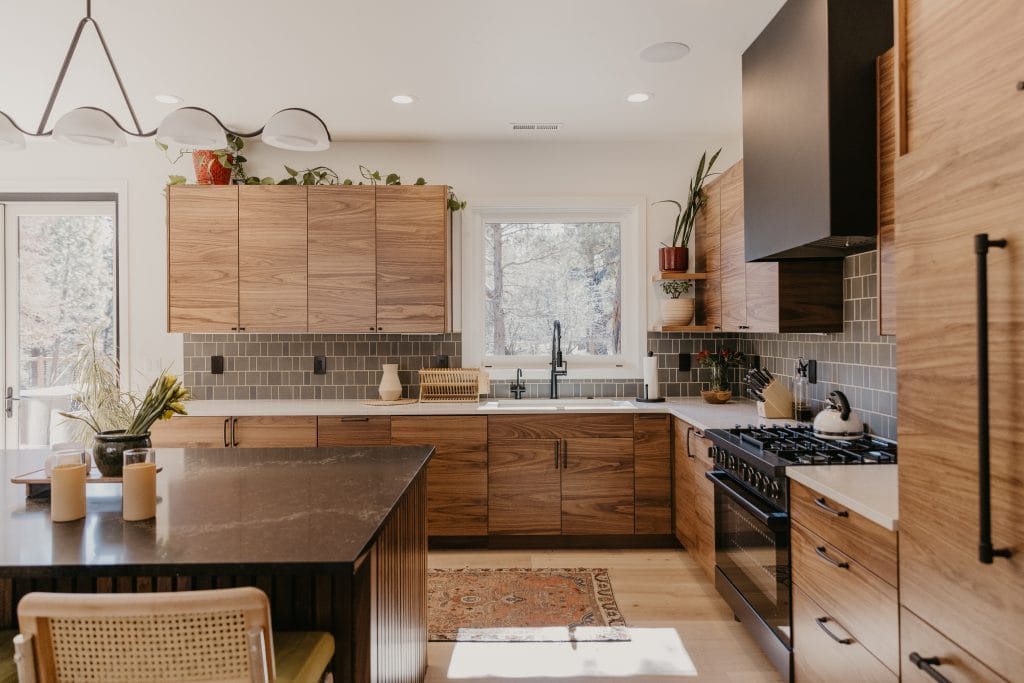
Granite is a natural stone that has been one of the most popular kitchen countertop materials for decades. Known for its stunning appearance, granite also adds a luxurious touch to any kitchen. Each slab is cut directly from the earth, offering a truly one-of-a-kind look.
Pros
- Unique Beauty: Each granite slab features distinctive veining and speckles, which give it a refined appearance that adds character to your kitchen.
- Heat-Resistant: Granite can withstand hot pots and pans without damage. Because it is naturally heat-resistant, it remains one of the top choices for avid cooks.
- Long-Lasting: With proper care, granite countertops can last for decades and remain in great condition.
Cons
- Requires Sealing: Granite countertops need to be sealed regularly to prevent stains, especially from acidic substances like wine or lemon.
- Heavy Material: Granite requires strong support structures, which can add to the installation cost.
- Costly: It’s less budget-friendly than other types of kitchen countertops. The price of granite can be high, especially for rare colors and patterns.
3. Marble Countertops: Utmost Elegance
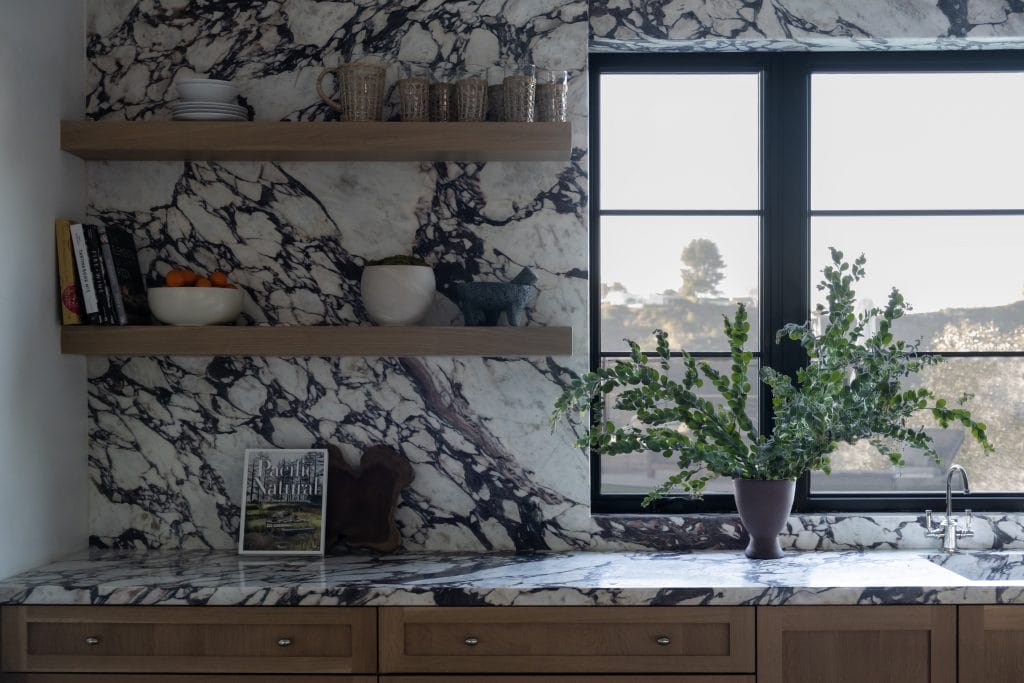
Marble is a classic material that brings a dash of sophistication to any kitchen. Known for its striking veining and soft luster, marble is often used in high-end homes. However, it is also softer and more porous than granite, hence it demands a little more care to maintain its allure.
Pros
- Sophisticated Look: The striking beauty of marble enhances the design of any kitchen with its smooth texture and luxurious feel.
- Cool Surface: Ideal for bakers, marble maintains a cool surface perfect for rolling dough or handling pastry.
- Adds Value: Marble countertops often increase the resale value of a home due to their premium nature.
Cons
- Stains Easily: Marble is porous and prone to staining, especially when exposed to acidic liquids like wine, coffee, or citrus juice.
- Scratches and Dents: Though durable, marble is more prone to scratches and chips compared to other natural stones like granite.
- Expensive: Compared to other types of kitchen countertops, marble is one of the priciest options available, often putting it out of reach for those with tight budgets.
- High maintenance: It requires regular sealing and gentle cleaning to preserve its look.
4. Butcher Block Countertops: Natural Charm
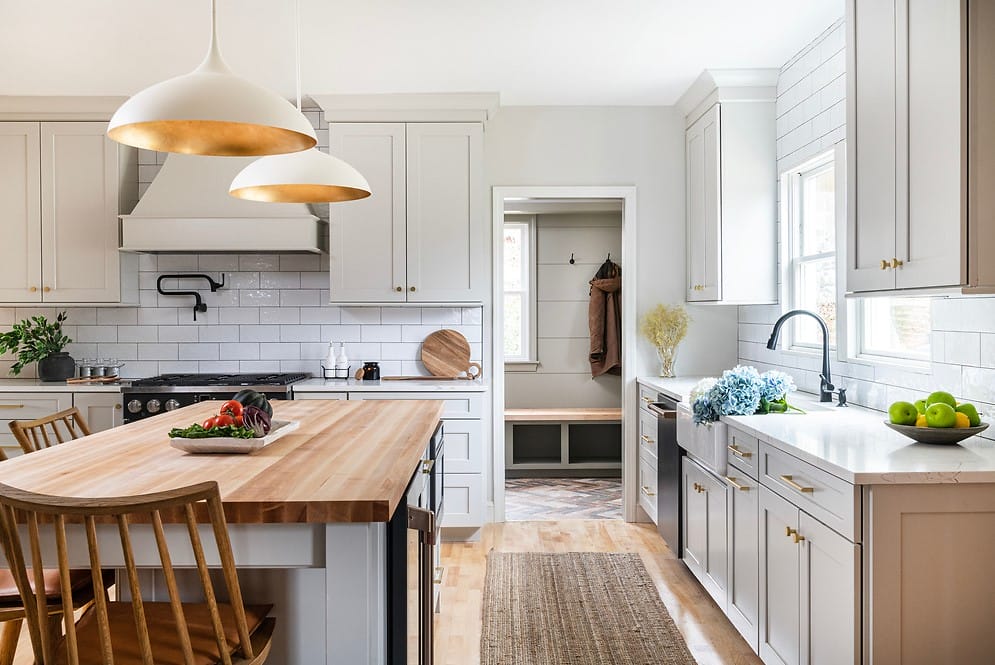
Butcher block countertops are made from planks, typically hardwoods such as maple, oak, or walnut. The wood’s warm, natural look makes it a great kitchen countertop material for a rustic or farmhouse-style home. Additionally, its tactile surface contrasts beautifully with smooth cabinetry or metal fixtures. You can use a butcher block as an accent, perhaps on an island or prep area, to add visual comfort and a handcrafted feel to the room.
Pros
- Warm Appearance: The natural wood finish adds a cozy feel to the kitchen, perfect for a welcoming atmosphere.
- Perfect for Cooking: A butcher block can be used for food prep, providing a knife-friendly surface for chopping and cutting.
- Can Be Resurfaced: If it gets scratched or worn over time, you can sand it down and refinish it to restore its original beauty.
Cons
- Requires Regular Maintenance: Butcher block needs to be oiled regularly to prevent it from drying out, cracking, warping, or absorbing moisture.
- Can Develop Scratches and Dents: Although resilient, wood is also prone to scratches, nicks, and dents (although they can add to its rustic charm).
- Surface Sensitivity: Hot cookware and lingering spills can easily cause staining or discoloration without proper care.
5. Laminate Countertops: Affordable Style
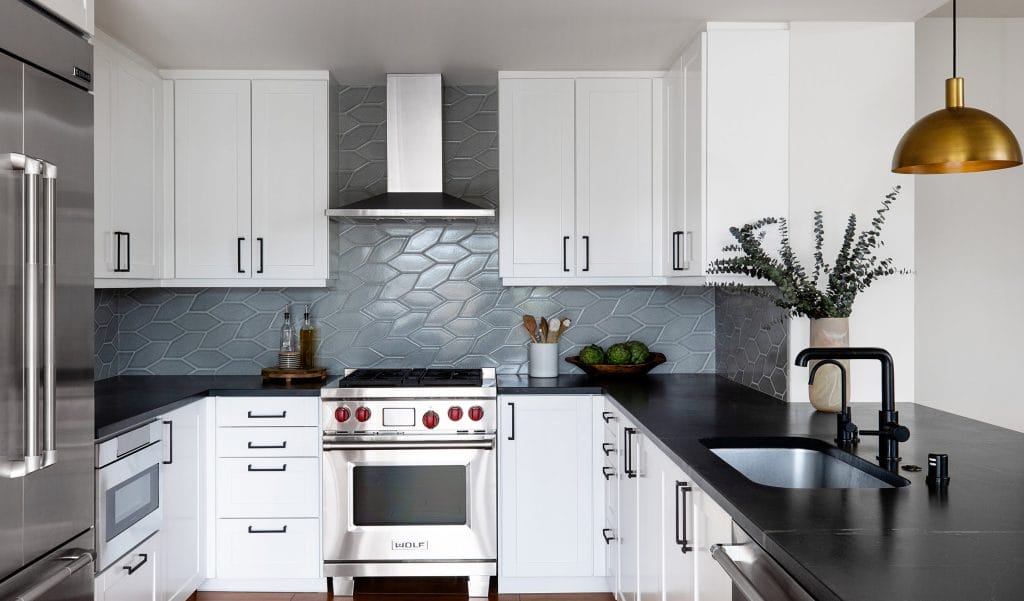
Laminate countertops are made from thin layers of plastic bonded to a substrate like particleboard or MDF. These types of countertops have evolved far beyond their dated reputation. Today’s versions use high-pressure laminates with realistic finishes that mimic stone, concrete, or wood. They offer a clean, polished appearance at a fraction of the cost of premium surfaces. In addition, laminate is lightweight and easy to install, thus perfect for quick updates or rental properties.
Pros
- Affordable: Laminate is one of the most affordable kitchen countertop materials—a great choice for those on a budget.
- Variety of Styles: Available in countless colors, patterns, and textures, laminate can easily match any kitchen décor.
- Easy to Clean: Laminate is simple to wipe down with soap and water, requiring little maintenance.
Cons
- Prone to Scratches and Burns: Laminate countertops are not as durable as natural stone. They can easily get chipped or scratched by sharp objects.
- Not as Heat-Resistant: Laminate can melt or bubble if exposed to hot pans or direct heat.
- Less Premium Appearance: While laminate can look like stone, it doesn’t have the same luxurious feel or long-lasting appeal as granite or marble.
6. Concrete Countertops: Industrial Touch
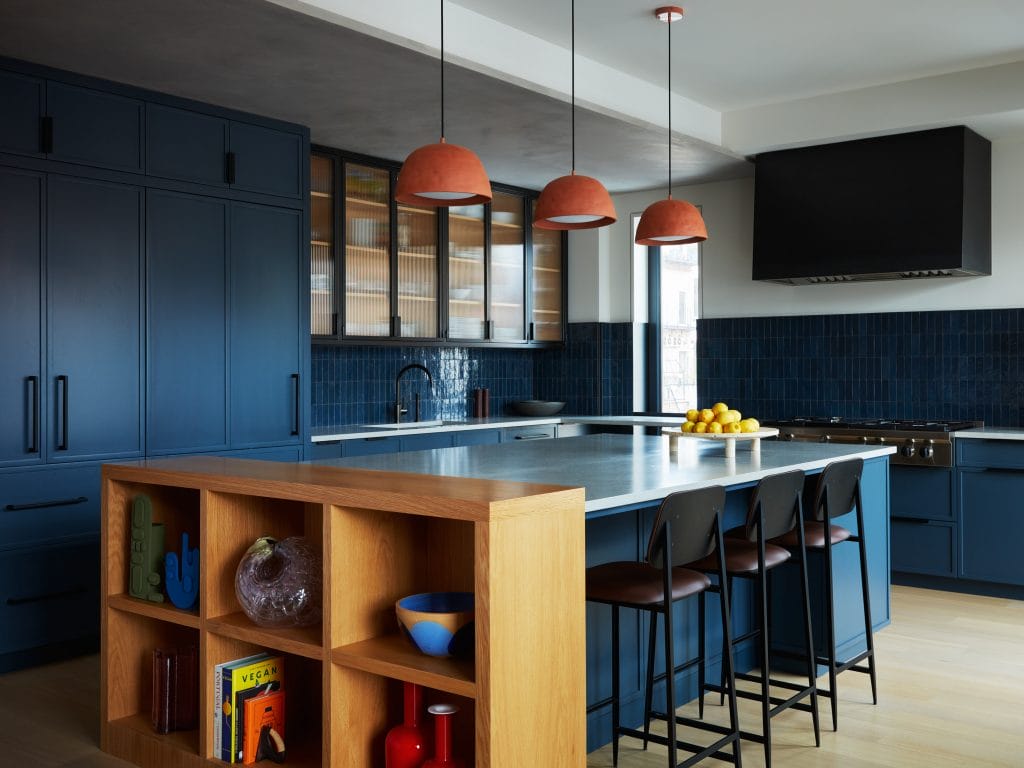
Concrete countertops offer a unique modern aesthetic with an industrial twist. They are made from a mixture of cement, sand, and aggregate, and can be molded into virtually any shape or size. Because they are handcrafted, these countertops can be fully customized with your choice of pigments, finishes, and embedded materials like glass or stone chips. Concrete maintains its durability and signature artistic look when sealed and cared for properly.
Pros
- Customizable: Concrete’s moldability makes it a good alternative for unique or custom-designed kitchens.
- Durable: It is a strong, long-lasting material that can withstand heavy use when properly maintained.
- Statement Look: Concrete creates a bold, modern appearance that stands out.
- Eco-Friendly: Many concrete countertops are made with recycled materials, providing a greener alternative for modern homes.
Cons
- Requires Sealing: Concrete is porous and needs to be sealed to avoid stains and moisture buildup.
- Prone to Cracking: Over time, concrete can develop small hairline cracks due to natural settling.
- Heavy: Concrete is extremely dense, so it requires strong reinforced cabinetry to support its weight.
7. Stainless Steel Countertops: Sleek Edge
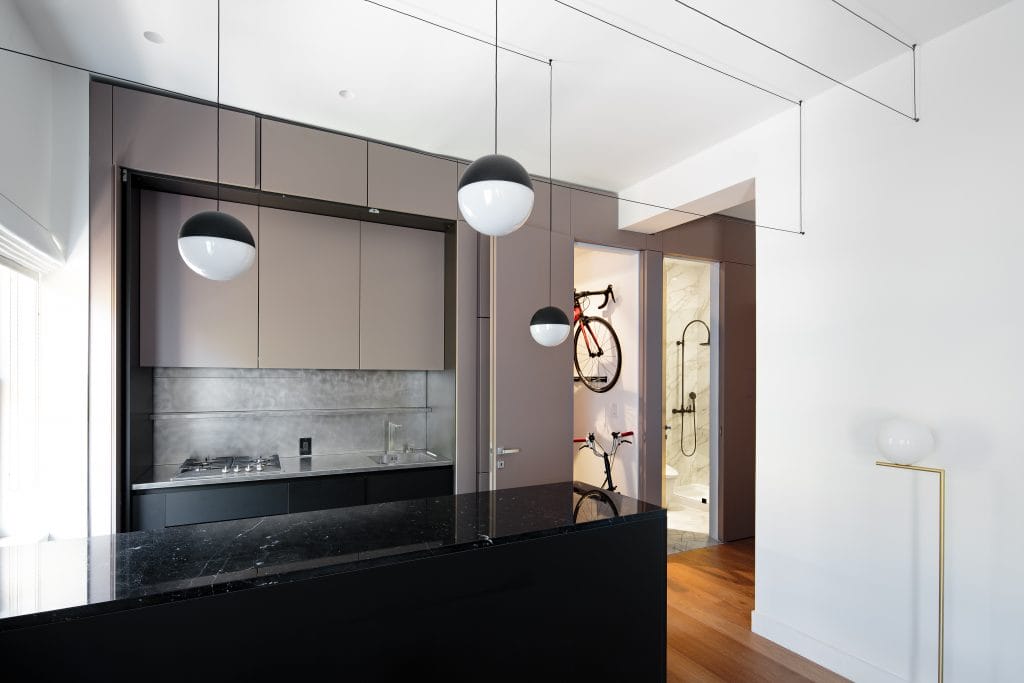
Stainless steel countertops offer a sleek, modern look commonly seen in commercial kitchens. Steel is heat-resistant and easy to clean and—for that reason—one of the most practical kitchen countertop materials. It can handle heavy use in busy kitchens without losing functionality. Furthermore, steel reflects light beautifully and blends well with modern cabinetry and appliances.
Pros
- Heat Resistant: Stainless steel can handle high heat without damage. This makes it perfect for cooking-heavy kitchens.
- Hygienic: It is non-porous and easy to clean. As a result, it is often a top option among different countertop types when cleanliness is a priority.
- Modern Aesthetic: Stainless steel offers a sleek, industrial look that is ideal for contemporary or minimalist kitchens.
Cons
- Prone to Scratches: Stainless steel scratches easily, which may leave visible marks over time.
- Shows Smudges and Fingerprints: The shiny surface of stainless steel shows fingerprints and smudges, requiring frequent cleaning.
- Cold and Sterile: Stainless steel can feel too cold and impersonal, especially in a traditional home kitchen design.
8. Recycled Material Countertops: Eco-Friendly Choice
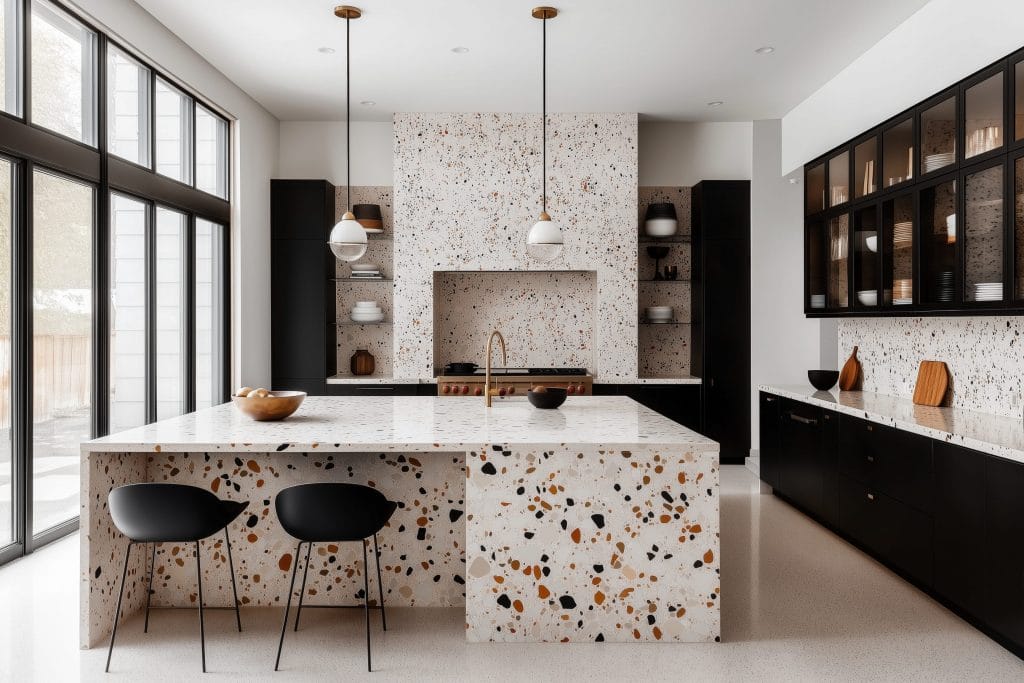
Recycled countertops use a creative mix of materials like glass, paper, and composite resin. They often feature colorful, mosaic-like surfaces that make a statement while supporting sustainability. These countertops appeal to eco-conscious homeowners who want to design responsibly without sacrificing style. Many varieties are handcrafted, giving kitchens a distinct and personalized look.
Pros
- Eco-Friendly: Recycled or sustainable types of kitchen countertops help reduce waste and environmental impact.
- Unique Designs: Recycled materials mixed with colorful glass or aggregates can give you an exceptional, eye-catching countertop.
- Durable: Many recycled material countertops are durable and resistant to daily surface wear.
Cons
- Variable Pricing: Depending on the material and design, recycled countertops can be costly.
- Hard to Find: Recycled countertop materials may not be as widely available as more common types.
- Less Familiar: Some recycled materials may not have the same proven track record for long-term durability as granite or quartz.
Need help choosing between the different countertop types?
For a creative, personalized edge, consider hiring an expert designer to guide you through materials, colors, and finishes that complement your space. Book your Free Online Interior Design Consultation to get started today!









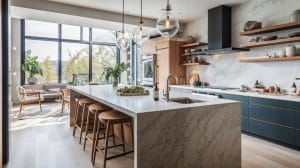
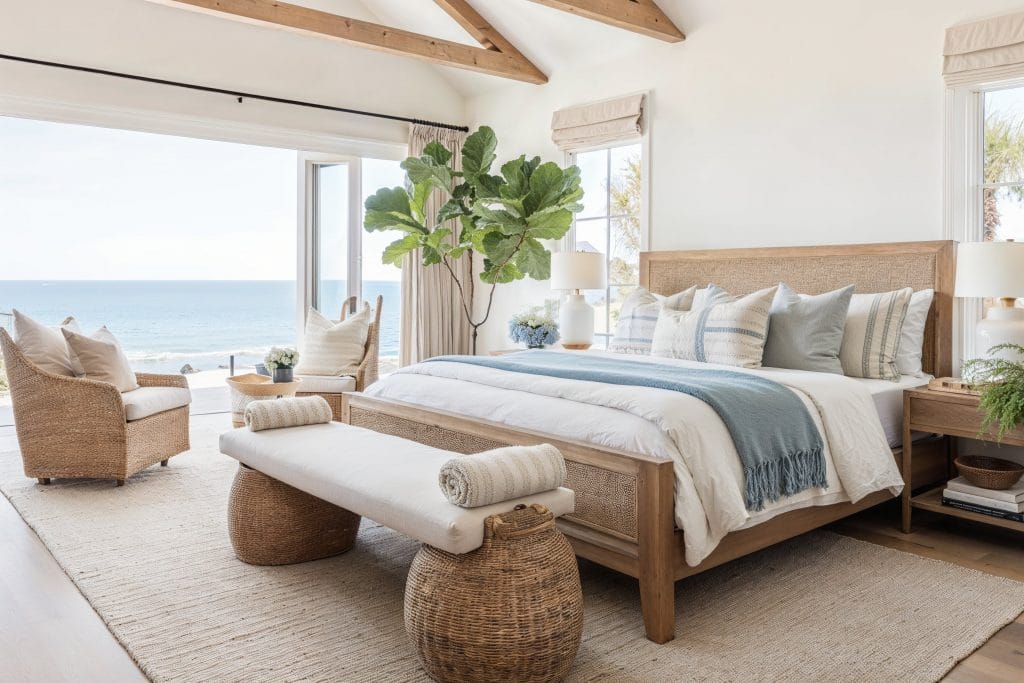
Comments